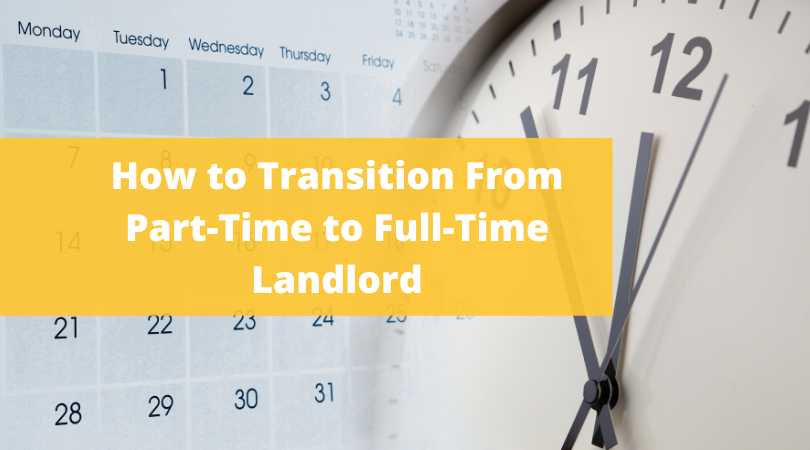
Transitioning from being a part-time landlord to a full-time one is a significant step, often reflecting a strategic shift in one’s professional and financial objectives. If you’re currently a part-time landlord planning to turn this venture into a full-time business, knowing the process of making this transition successfully is crucial to your profitability.
Here are some tips you’ll need to consider:
Perform Comprehensive Market Analysis
Understanding the real estate market deeply is important for full-time landlords. This includes not only keeping up with current property values and rental rates, but also having insight into long-term market trends.
Knowledge about the local economy, demographic shifts, and new real estate developments can provide a competitive edge in making strategic investment decisions.
Having Personal Readiness
Assessing your readiness for the full-time responsibilities of being a landlord is critical. This involves considering if you are prepared to handle the demands of managing more properties, dealing with resident issues more frequently, and dedicating a significant portion of your time to your rental.
It’s also important to consider the impact on your personal life, as a full-time landlord may require being on-call for emergencies and handling property issues outside of traditional working hours.
Stockpile Some Cash
Before transitioning to full-time, it’s recommended to have a substantial financial cushion. Experts often suggest having at least nine to 12 months of living expenses saved.

This buffer helps manage the initial uncertainties and fluctuations in rental income and provides stability during the early stages of establishing yourself as a full-time landlord. It’s also a safety net for unexpected expenses related to property maintenance or vacancies.
Build a Portfolio First
Having a few rental properties in your portfolio before making the transition is advisable. This experience not only gives you a taste of what being a full-time landlord entails, but also ensures that you have a foundation of steady cash flow.
Starting with two or three properties allows you to understand the day-to-day challenges and rewards of being a landlord, making you better equipped to decide if this is the right path for you.
Diversify
Diversification in real estate is key to mitigating risks. This could mean investing in different properties, such as residential, commercial, or vacation rentals, or in various geographic locations. By not putting all your eggs in one basket, you can safeguard against market fluctuations in a particular sector or region. This approach also opens up multiple income streams, contributing to greater financial stability.
Consider Your Financing Options
As a full-time landlord, your approach to acquiring new properties might involve traditional mortgages, real estate investment loans, or tapping into the equity of existing properties. It’s important to be aware of the different financing options available and their implications to make informed and sustainable financial decisions.
Maintain Legal Knowledge
A full-time landlord must have a firm grasp of the legal aspects of property rental. This includes understanding landlord-tenant laws, fair housing regulations, and local ordinances to ensure compliance and avoid legal disputes.

Staying informed about legal changes and updates is also essential for maintaining lawful and ethical practices.
Learn About Contracts and Documentation
Professionalizing your approach to legal documents, particularly lease agreements, is crucial.
This might mean working with a professional property manager to ensure that your contracts are comprehensive, fair, and legally sound. Clear and well-structured legal documents can protect your interests and provide clarity for both you and your residents.
Hire Professional Property Management
Hiring a property management company becomes more helpful as you acquire more properties. Managing multiple properties can be time-consuming and complex, requiring strong organizational skills.
However, a property management company can relieve you of these tasks, allowing you to focus on other aspects of your business.
Be Ready for Maintenance and Upkeep
Developing a systematic approach to property maintenance and emergency repairs is essential. This includes having a network of reliable contractors and understanding basic property maintenance to ensure the quality and necessity of work performed. Regular maintenance can prevent more significant issues down the line and maintain the value of your properties.
Maintain Good Renter Relationships
Building and maintaining good relationships with residents is pivotal for long-term success. Responsive and fair interactions can lead to longer tenancies, reduce vacancies, and create a positive reputation for you as a landlord.
Network
Joining local landlord associations or real estate investment groups can be highly beneficial.

These groups provide a platform for sharing knowledge, resources, and experiences with peers. Networking can also lead to partnerships, investment opportunities, and a stronger understanding of the local real estate market.
Embrace Technology
Incorporating technology into your property management practices can greatly enhance efficiency. This includes using software for rent collection, maintenance requests, resident screening, and financial tracking. Leveraging technology can save time, reduce errors, and provide a more professional experience for both you and your residents.
Embrace Continuous Learning
The real estate market is constantly evolving, making continuous learning crucial. Staying updated on trends, new property management strategies, and legal changes is important.
This could involve attending workshops, participating in webinars, or reading industry publications. Lifelong learning will keep you adaptable and informed, enabling you to make better decisions for your business.
Don’t Burn Any Bridges
When transitioning from your current job to being a full-time landlord, it’s important to maintain professional relationships. Even if you don’t plan to return to your previous career, these connections can be valuable for future business opportunities, references, or support. Keeping these relationships positive can also reflect well on your professional reputation.
Conclusion
Transitioning to a full-time landlord is a multi-faceted process that involves careful planning, financial prudence, legal knowledge, and a strategic approach to property management and expansion. By diligently following these expanded tips and continuously adapting to changes in the real estate market, you can navigate this transition successfully and establish a thriving full-time rental business.
If you need assistance, contact Five Star Property Management and we will be glad to serve you!
